

FCC approves plan to consider paid priority on Internet. The Federal Communications Commission on Thursday voted in favor of advancing a proposal that could dramatically reshape the way consumers experience the Internet, opening the possibility of Internet service providers charging Web sites for higher-quality delivery of their content to American consumers.
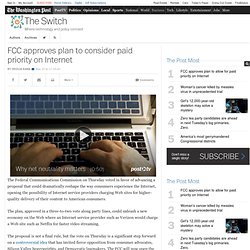
The plan, approved in a three-to-two vote along party lines, could unleash a new economy on the Web where an Internet service provider such as Verizon would charge a Web site such as Netflix for faster video streaming. The proposal is not a final rule, but the vote on Thursday is a significant step forward on a controversial idea that has invited fierce opposition from consumer advocates, Silicon Valley heavyweights, and Democratic lawmakers.
The FCC will now open the proposal to a total 120 days of public comment. Final rules, aimed for the end of the year, could be rewritten after the agency reviews the public comments. "There is one Internet. "I would have done this differently. Ted Cruz bill would ban 'FCC's latest adventure in net neutrality' Save the Internet. CISPA is back. Fightfortheftr: URGENT: CISA (CISPA 3.0) just ... New #CISA bill passed by Senate committee is widely seen as redux of last year’s #CISPA bill. 11 Governments Are Meeting in Peru to Figure Out How They Can Control the Internet. By Patrick McGuire Remember SOPA?
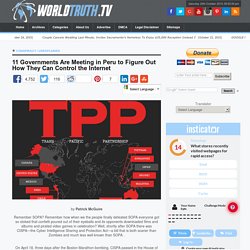
Remember how when we the people finally defeated SOPA everyone got so stoked that confetti poured out of their eyeballs and its opponents downloaded films and albums and pirated video games in celebration? Well, shortly after SOPA there was CISPA—the Cyber Intelligence Sharing and Protection Act—a bill that is both scarier than Zombies and much less well known than SOPA . On April 18, three days after the Boston Marathon bombing, CISPA passed in the House of Representatives. Obama’s White House has expressed “fundamental concerns” about CISPA. As a Canadian, these American “mess up the internet” bills have always been disconcerting. But now it appears that it’s going to be even easier for international copyright offenders to be tried in court by the interests–and lobbying power–of Hollywood. Why There’s No Mass Protest Over Government Surveillance.
The Internet’s biggest organizations collectively rose up in outrage over a potential act of government censorship, yet have been conspicuously silent as Congress mulls sweeping new government surveillance authority.
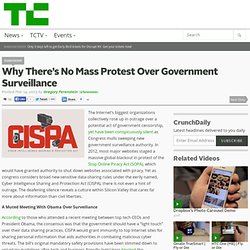
In 2012, most major websites staged a massive global blackout in protest of the Stop Online Piracy Act (SOPA), which would have granted authority to shut down websites associated with piracy. Yet as congress considers broad new sensitive data-sharing rules under the eerily named, Cyber Intelligence Sharing and Protection Act (CISPA), there is not even a hint of outrage. The deafening silence reveals a culture within Silicon Valley that cares far more about information than civil liberties.
Timeline Photos. Cispa. CISPA Continues To Draw Opposition. Cyber threats are real and have affected major corporations.
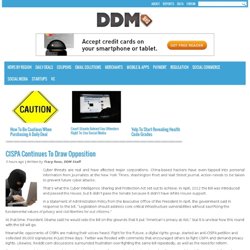
China-based hackers have even tapped into personal information from journalists at the New York Times, Washington Post and Wall Street Journal. Action needs to be taken to prevent future cyber attacks. That’s what the Cyber Intelligence Sharing and Protection Act set out to achieve. In April, 2012 the bill was introduced and passed the House, but it didn’t pass the Senate because it didn’t have White House support. CISPA: say 'goodbye' to privacy and freedom. Richard Stallman: CISPA nearly abolishes people's right not to be unreasonably searched. CISPA Another Fascist Takeover of the Internet. Worse Than SOPA- CISPA Will Allow Monitoring Any Online Communication (#Censorship) » CISPA: Congress Takes Another Run at the Internet Alex Jones. Daisy Luther Infowars.com April 10, 2012 Once upon a time there was a bill called SOPA.
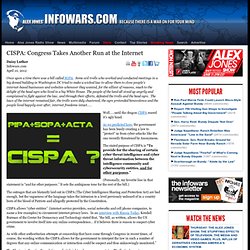
Some evil trolls who worked and conducted meetings in a big domed building in Washington DC tried to make a wicked law to allow them to close people’s internet-based businesses and websites whenever they wanted, for the silliest of reasons, much to the delight of the head ogre who lived in a big White House. Panetta invokes Pearl Harbor to illustrate cyber security dangers. U.S.
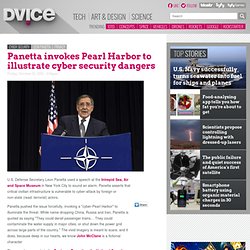
Defense Secretary Leon Panetta used a speech at the Intrepid Sea, Air and Space Museum in New York City to sound an alarm. Panetta asserts that critical civilian infrastructure is vulnerable to cyber-attack by foreign or non-state (read: terrorist) actors. CISPA. CISPA STOP. PIPA SOPA. SOPA - PIPA. SOPA / PIPA. #SOPA. SOPA Supporter: If You Use DNSSEC You Can Ignore SOPA/PIPA. Daniel Castro from the Information Technology and Innovation Foundation (ITIF) is the guy who has been highlighted for coming up with the idea of censoring the internet to deal with copyright infringement online.
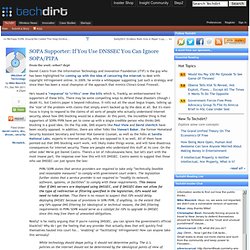
In 2009, he wrote a whitepaper suggesting just such a strategy, and since then has been a vocal champion of the approach that mimics China's Great Firewall. He's issued a "response" to "critics" over the bills which is, frankly, an embarrassment for supporters of these bills. There may be some compelling ways to defend these disasters (though I doubt it), but Castro's paper is beyond ridiculous. It rolls out all the usual bogus tropes, talking up the "size" of the problem with claims that simply aren't backed up by the data at all. But it's main focus is trying to respond to the claims of all sorts of people who actually understand internet security, about how DNS blocking would be a disaster. Really? While technology should shape policy, it should not determine policy. SOPA and PIPA 2012. SOPA.